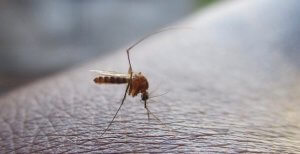Mosquitoes have been integral to the historic landscape since the Jurassic period, some 210 million years ago when dinosaurs roamed the earth. While there are no records of giant mosquitoes soaring through the skies, they were there foraging and scrounging for survival just as heartily as the feared Tyrannosaurus Rex. They have appeared in the writings of both Aristotle around 300 BC and Sidonius Apollinaris in 467 BC.
Globally speaking, there are about 3,000 species of these small insects. More than 170 species of mosquito are found in North America alone and they vary in size, geographic distribution and behavior. Their size belies their danger to humanity, as they are known to transmit more deadly, infectious diseases than any other creature on earth. Their bites cause millions of deaths every year among children and elderly populations in developing nations, and particularly throughout the summer months in Greater Pittsburgh.
To that point, just last year we were all alarmed to have discovered a number of mosquito colonies found throughout Allegheny County tested positive for West Nile Virus, underscoring the absolute importance of professional pest control and the implementation of preventative measures.
Read on to learn more about how you can help protect yourself, your family, friends and neighbors from mosquitos, or contact our teams today to engage our professional ongoing pest control maintenance programs. (412) 252-5200.
The Mosquito’s Habitat and Behavior
Spring and summer mark the time when Pittsburgh residents must prepare for the onslaught of mosquito season because ready or not, here they come. The experts at Pestco, a superior pest control and pest management company serving Pittsburgh and environs, know full well that mosquitoes can and often do run havoc during these warmer months of the year. This is because mosquitoes lay eggs before dying off in the fall and when the weather becomes warmer, these eggs hatch.
It doesn’t take very long for a new “mosquito nation” to fill up a backyard and ruin parties and barbecues once again. All mosquito species lay their eggs in standing water that is fresh, salt or brackish. The larvae when they hatch are known as wrigglers, and they feed in water for about a week before emerging as adults.
The male adult mosquito feeds mostly on flower nectar and does not bite humans, but the females require blood meals for the derived protein they provide to produce eggs. According to Bill Todaro, an entomologist at the Allegheny County Health Department: “Male mosquitoes are only interested in sex.”
A female mosquito doubles her weight in a single feeding, which will satiate her needs for about three days. Preferred feeding times vary from species to species, as some prefer twilight while others the bright light of day. Other preferences include choices of cuisine, so to speak, as some dine on the blood of birds and other small animals and others like to feast on humans. Some species switch from one to the other, seeking out food sources wherever they can find them.
Pittsburgh Residents And Mosquitoes
As mentioned earlier, last year, Pittsburgh residents became alarmed when mosquitoes collected from five neighborhoods tested positive for the West Nile Virus, prompting the Allegheny County Health Department to take action and schedule mosquito treatment in affected areas. These included: Mt. Washington, Beltzhoover, South Side Flats, South Side Slopes and Hazelwood.
Symptoms of the West Nile Virus typically resemble those of a mild flu and can include: a fever, headache, body aches, joint pains, vomiting, diarrhea, or rash. According to Patrick McDonnell, Pennsylvania Department of Environmental Protection (DEP) secretary: “While the symptoms may not seem threatening in the vast majority of cases, serious impacts to health can occur from being bitten by mosquitoes that carry this virus, as they can lead to more serious conditions that includes swelling of the brain, muscle convulsions, coma, paralysis, and death.”
DEP statistics indicate the percentage of insects carrying the West Nile Virus is at its highest level since the year, 2000, when they first appeared in Pennsylvania. State legislators and Governor Tom Wolf have reacted responsibly to the increased risk by approving a $140,000 increase to the state’s West Nile Virus program budget. The program is focused on shrinking mosquito habitat and also targets cleanup of dumps containing abandoned tire piles and other stagnant water sites.

Other Serious Mosquito-Borne Illnesses
Besides the West Nile Virus, dangerous diseases that are spread by the bite of a mosquito include: Zika Virus, Dengue Fever and Malaria.
- The Zika Virus
This virus spreads from the bite of a daytime-active, infected Aedes mosquito. In the case of pregnant women particularly, this virus can cause devastating birth defects and pregnant women should not travel to areas, which are known for Zika activity. The chance of contracting the Zika Virus depends on individual travel history and the travel history of a sexual partner.
Currently, there are no reports of local transmissions of the Zika Virus in the continental United States, including in Florida and Texas, where there were local occurrences in 2016 and 2017. Still, most troubling of all is the fact that currently there is no vaccine to protect against the transmission of this destructive infection.
- Dengue Fever
The bite of an Aedes (also known as the Asian Tiger) mosquito infected with Dengue Virus causes this serious debilitating condition, which is a leading cause of as many as 400 million deaths every year in the tropical regions of the world. It is after the second time a person is bitten that an infection follows. This puts a victim at a significantly higher risk of contracting severe symptoms which are often fatal and can include: high fever, serious bleeding and shock.

Since the 1950s, Dengue has posed serious health issues, and to compound the problem, there are no vaccines to prevent the spread of this infection. When bitten, early treatment can help to substantially lower the risks of medical complications and death. It is endemic in Puerto Rico, many popular Latin-American tourist areas. It is also found in Southeast Asia and the Pacific.
- Malaria
Perhaps the best known of mosquito-transmitted diseases, malaria is an infectious, debilitating and often fatal condition that is caused by the bite of the Anopheles mosquito. Transmission occurs between dusk and dawn, which are the feeding times of this particular mosquito. Symptoms include: cycles of fever, chills, sweats and headaches, and in severe cases, bleeding, shock, kidney and liver failure. Travelers to areas where malaria is prevalent can take preventive infection medication if exposed.
Preventive Measures To Combat Mosquito Infestations
The best way to keep mosquitoes away is to eliminate any standing water around a residence. Anything that can retain water is potentially problematic. Mosquitoes cannot breed without standing water and they need very little to hatch their eggs. Even the smallest area of water should be kept indoors, such as that found in a potted plant, pet dishes, toys and bird-baths.
Pittsburgh Residents should also make sure that open windows and doors have well maintained screens. Insect repellant on exposed skin as well as minimizing the amount of time spent outdoors, particularly at dawn or dusk, also helps to serve as a barrier between human skin and that ubiquitous mosquito in search of a blood meal. A large fan on a deck can offer a low tech solution.
According to DEP biologist, Matt Helwig, mosquitoes are very weak flyers and they do not venture far from their breeding site. “It doesn’t take much for several hundred mosquitoes to be born. The small pool of water that collects in a single upturned bottle cap is an incubator for as many as 300 mosquito eggs.”
Matt Helwig goes on to say: “If there are mosquitoes in your backyard or neighborhood, they are likely laying eggs there as well. If mosquitoes are biting you, they are 9 times out of 10 coming from your own property. Get rid of even small amounts of standing water around your home.”
Pittsburgh residents should also check their gutters on a regular basis. They can become hotbeds for mosquitoes if they are either broken or obstructed. Filling in low spots is also an important preventive measure. Filling in these spots will prevent puddles from forming and will permit rainwater to soak evenly the way it should rather than overflowing onto already saturated soil.
Effective mosquito prevention is achieved via a combination of vigilant efforts on the part of Pittsburgh homeowners in conjunction with the services of a professional pest control and pest management company they can rely on.
According to DEP secretary, Patrick McDonnell, “It is imperative that Pennsylvania residents take common-sense precautions to protect themselves from mosquitoes. Precautionary measures include eliminating places where mosquitoes can lay eggs, using insect repellent and other protective measures, like wearing long pants and long-sleeved shirts in mosquito-prone areas.”
Pestco Professional Services Pest Control Solutions
There is no treatment in the world that can permanently eliminate mosquitoes from a residential backyard. A combination of the above-mentioned preventive measures and the deployment of a reputable pest control and pest management specialist, such as Pestco Professional Services, is the best remedy for consistent success.
We are a family-run business and have been an industrial leader in pest control solutions throughout Pittsburgh and western Pennsylvania since our inception in 1948. We have the distinction of being the only commercial pest control and pest management company within the United States that manufactures a number of the products we use.

Our growth and success over the last seven decades is largely due to our superior services, products and pest control strategies for homeowners afflicted with pest infestations of all types. Our technicians are highly knowledgeable and trained extensively to address the uniqueness and challenges of any pest infestation. Our teams attend company workshops to ensure they are always on top of and a few steps ahead of the many pests they encounter on a daily basis.
So, if you are a Pittsburgh homeowner happily anticipating summer outdoor barbecues and picnics, make sure you take all of the precautions mentioned above. Give us a call if you notice any mosquito activity — (412) 252-5200. We’re here to help, and to keep that buzz that surrounds your backyard activities limited to the sounds of human conversation only.
Happy Spring and Summer everyone!
Final thought about mosquitoes: If you think you are too small to have an impact, try going to bed with a mosquito. ~ Anita Roddick
Some Interesting Facts About Mosquitoes
Despite their persistent, annoying nature, there are some odd facts about mosquitoes that set them apart in nature. Their benefits to the world at large are hardly questionable, but they are unique critters with their own distinctive traits. Below are a few to consider, but keep that swatter nearby.
- Some People Attract Mosquitoes More Than Others
According to Bill Todaro, “Whether you get bitten or not has a lot to do with your personal chemistry. Carbon dioxide out of your breath and other hormones that emerge from our skin make humans very attractive to mosquitoes.”
- Raindrops Affect Mosquitoes
Raindrops shove mosquitoes downward at 100 to 300 times the force of gravity.
- Mosquitoes Are A Type Of Fly
Even their name derives from the Spanish word meaning, “little fly.” The word is said to have originated in the early 16th century. In Africa, New Zealand and Australia, mosquitoes are often known as “Mozzies.
- Mosquito Wings Hum At 200 to 500 Beats Per Second
Male mosquitoes locate females by the sound of their wings. Females can beat their wings up to 500 times per second, and the males pick out the higher frequency of those beats when seeking a mate.
- West Virginia Has The Fewest Species of Mosquitoes
There are 26 known species in this mountainous state, while Texas has the most with 85. Florida comes in second with 80 identified species.
- Mosquitoes Don’t Have Teeth
Female mosquitoes “bite” with a long, pointed mouthpart called a proboscis. They use the serrated proboscis to pierce the skin and locate a capillary, then draw blood through one of two tubes.
- Female Mosquitoes Can Lay Up To 300 Eggs At A Time
Usually, the eggs are deposited on the surface of stagnant water, or in areas that flood regularly. They are laid in bunches known as rafts. Eggs can hatch in as little as an inch of standing water. Females lay eggs up to three times before they die.
- Mosquitoes Are Hibernators
Mosquitoes are cold-blooded and prefer temperatures over 80 degrees. When temperatures drop to les than 50 degrees, many females shut down and wait for warmer weather. Others may lay their eggs in freezing water and die. The eggs keep until spring and early summer when they hatch.
- Mosquitoes Spend Their First Ten Days In Water
Mosquito larvae hatch in water. They feed on the organic matter found in stagnant water and breathe oxygen from the surface. As they develop into pupae, they do not feed at all and are partially enclosed in cocoons. It takes a few days for them to emerge as adult mosquitoes.
- Mosquitoes Generally Fly Below 25 Feet
While this is true as a general rule, some mosquito species have been discovered at unexpected heights, including 8,000 feet up in the Himalayas.
- The Average Mosquito Lifespan Is Less Than Two Months
Usually males live for 10 days or less and females can live for about six to eight weeks, under ideal conditions.
If you have any residential or commercial pest control problems with mosquitos, or you want to get proactive to protect you home or community, call our team at Pestco Professional Services for a free estimate! (412) 252-5200
 Over 300 Reviews
Over 300 Reviews 
